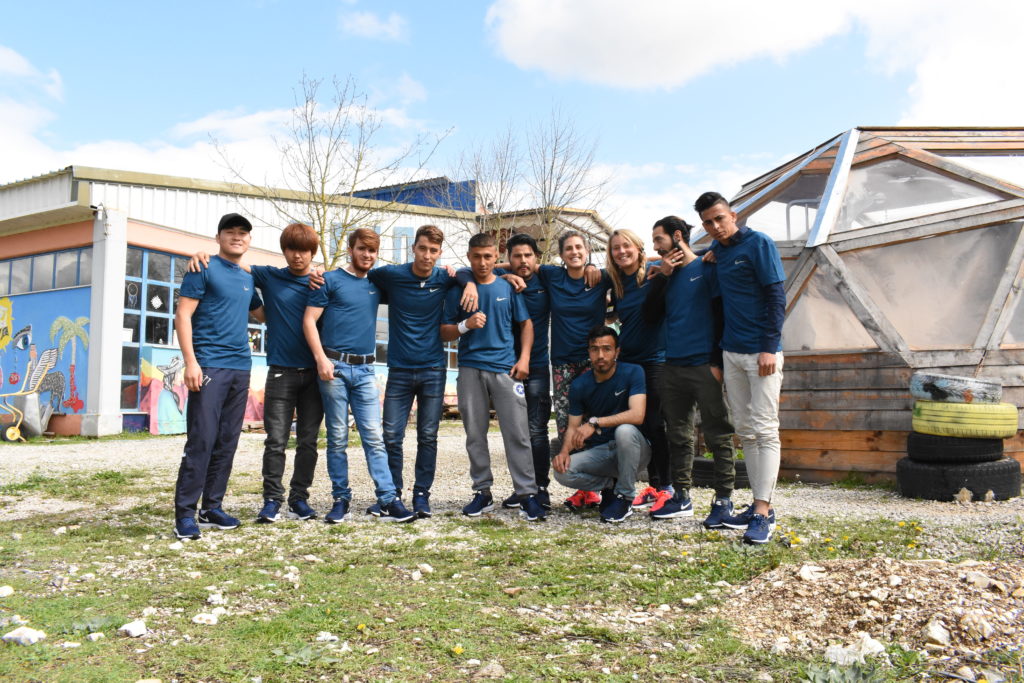Thirteen sports-lovers from Asia, Africa and Europe are joining forces this weekend, to run the Olympia half-marathon for freedom of movement. The runners – refugees from Syria, Afghanistan and Cameroon, who now live at camps in Ioannina, Epirus, and humanitarian volunteers at Habibi.Works, Katsikas, from Germany and the Netherlands – will run the race together on Sunday 1 April.
Habibi.Works volunteer Kiki Hoher, explained: ‘Our running team is made up of members of our immediate community, one which has grown up in a small space perhaps just over a square kilometre in size. Within it we have former and current sportspeople, and a large number of people who have been imprisoned for almost two years, without committing any crime, and are still denied the freedom to move. ‘We are taking part in the half-Marathon as a challenge, to draw attention to people’s lack of the right to freedom of movement, and also because we want to take part as part of a wider community. We want to take part in a great event, and to run for freedom of movement for all.’
The small team is able to run thanks to a fundraising campaign, which thanks to kind donations from members of the public, the Olympia Half-Marathon organisers (who gave the team a discount on registration fees) and a donation of sports equipment from a well-known sporting-goods company, reached its target late this week.
One donor, was Suhaim, a 12 year-old boy from Qatar, who said: ‘I would really like you to join the marathon contestants on 1 April. I wish you luck in this run, and in your life.’
The race is an opportunity for the refugees, most of whom were keen sports people (and some were sports professionals) to re-engage with sport, helping to re-order, re-structure and re-start their lives in their new community here in Greece.
One runner, Dia, a refugee from Syria, was born at Yarmouk Camp, Damascus, to parents who had fled the Palestinian territories. He left Syria in 2011, and spent four years in Lebanon, then one in Turkey, before arriving at Samos a year ago. He is now based at Filippiada. He said: ‘I was a professional football player in Syria, playing for two sides, Majd and Wahda, so football and training – all sport – meant everything to me. ‘Now I am here the half-marathon is a chance to do two things – to bring myself back to fitness after my injury and being forced to escape, and bringing attention to the situation so many people are in now, where because war means we cannot live in their home countries, and cannot move freely, we are prevented from rebuilding and becoming a part of our community. ‘For me, it is a chance to finally be able to take part in sport again, but also freedom of movement is important for Greek people and refugees. We must be able to mix with one another and meet one another, so we can all avoid extremism and racism.’
Elske Voermans, a volunteer at Habibi.Works who is also set to run on Sunday, said: ‘Many refugees here in Greece have a roof above their heads, but apart from that there is nothing. No psychological care, no access to education, no sport activities, nothing. Even where some activities are in place, boredom and psychological issues are a big problem. ‘But because we were already running every morning, we got the idea to start running with our neighbours from the camps. ‘And our participation in the half-marathon is also to address the situation of refugees here in Greece. Because these are people who have been forced to leave everything behind to find a better and safer place to live, but are yet again stuck in a very rough and often seemingly-hopeless situation. ‘They have no freedom of movement, something everyone should have. So we are running together, for everyone’s right to freedom of movement. ‘Free movement of money is seen as a benefit, and as a common-sense element of all our lives, but freedom for people (who, after all, money is meant to serve), is treated with suspicion. Our run symbolizes the building of bridges between communities, and is to call for us all to rethink, and to enable people to move where they wish to, as well as to help ensure that people are not – as so many have been in the last decade – forced to move against their wishes.’

